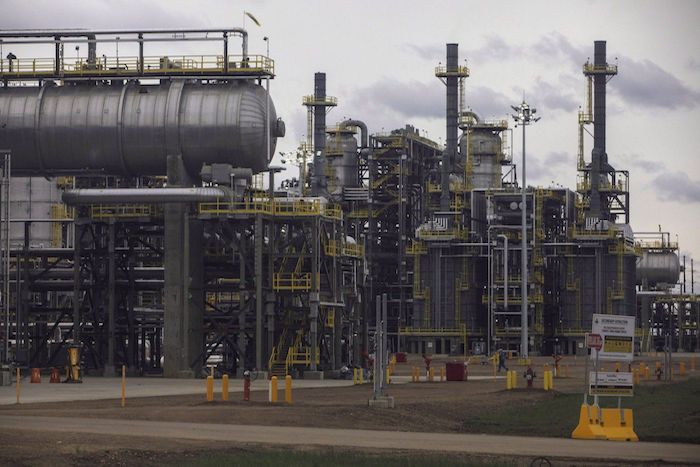Alberta
Suncor’s fourth-quarter profits increase 76 per cent to $2.74 billion

A processing unit at Suncor’s Fort Hills facility in Fort McMurray, Alta., on Monday, Sept. 10, 2018. Suncor Energy Inc. says it earned $2.74 billion in the fourth quarter of 2022, a 76 per cent increase from the $1.55 billion it earned in the same three months of 2021. THE CANADIAN PRESS/Jason Franson
Calgary – Suncor Energy Inc. says it earned $2.74 billion in the fourth quarter of 2022, a 76 per cent increase from the $1.55 billion it earned in the same three months of 2021.
The Calgary-based company says its increased profit was due to the higher price of crude and refined product realizations as well as higher upstream production, partially offset by increased operating expenses.
On an adjusted basis, Suncor says it earned $2.43 billion, or $1.81 per common share, compared to $1.30 billion or 89 cents per common share in the prior year’s quarter.
The energy giant says its total upstream production increased to 763,100 barrels of oil equivalent per day (boe/d) in the fourth quarter of 2022, compared to 743,300 boe/d in the prior year quarter, primarily driven by increased production from the company’s oilsands assets.
Suncor’s refinery crude throughput was 440,000 barrels per day and its refinery utilization was 94 per cent in the fourth quarter of 2022, compared to 447,000 bbls/d and 96 per cent in the prior-year quarter.
It attributes the decrease in part to unexpected maintenance that occurred in the quarter, including that required as a result of bad weather at the company’s Commerce City refinery.
This report by The Canadian Press was first published Feb. 14, 2023.
Companies in this story: (TSX:SU)
Alberta
Unified message for Ottawa: Premier Danielle Smith and Premier Scott Moe call for change to federal policies

United in call for change: Joint statement |
“Wednesday, Alberta’s and Saskatchewan’s governments came together in Lloydminster to make a unified call for national change.
“Together, we call for an end to all federal interference in the development of provincial resources by:
- repealing or overhauling the Impact Assessment Act to respect provincial jurisdiction and eliminate barriers to nation-building resource development and transportation projects;
- eliminating the proposed oil and gas emissions cap;
- scrapping the Clean Electricity Regulations;
- lifting the oil tanker ban off the northern west coast;
- abandoning the net-zero vehicle mandate; and
- repealing any federal law or regulation that purports to regulate industrial carbon emissions, plastics or the commercial free speech of energy companies.
“The federal government must remove the barriers it created and fix the federal project approval processes so that private sector proponents have the confidence to invest.
“Starting with additional oil and gas pipeline access to tidewater on the west coast, our provinces must also see guaranteed corridor and port-to-port access to tidewater off the Pacific, Arctic and Atlantic coasts. This is critical for the international export of oil, gas, critical minerals, agricultural and forestry products, and other resources. Accessing world prices for our resources will benefit all Canadians, including our First Nations partners.
“Canada is facing a trade war on two fronts. The People’s Republic of China’s ‘anti-discrimination’ tariffs imposed on Canadian agri-food products have significant impacts on the West. We continue to call on the federal government to prioritize work towards the removal of Chinese tariffs. Recently announced tariff increases, on top of pre-existing tariffs, by the United States on Canadian steel and aluminum products are deeply concerning. We urge the Prime Minister to continue his work with the U.S. administration to seek the removal of all tariffs currently being imposed by the U.S. on Canada.
“Alberta and Saskatchewan agree that the federal government must change its policies if it is to reach its stated goal of becoming a global energy superpower and having the strongest economy in the G7. We need to have a federal government that works with, rather than against, the economic interests of Alberta and Saskatchewan. Making these changes will demonstrate the new Prime Minister’s commitment to doing so. Together, we will continue to fight to deliver on the immense potential of our provinces for the benefit of the people of Saskatchewan and Alberta.”
Alberta
Calls for a new pipeline to the coast are only getting louder

From Resource Works
Alberta wants a new oil pipeline to Prince Rupert in British Columbia.
Calls on the federal government to fast-track new pipelines in Canada have grown. But there’s some confusion that needs to be cleared up about what Ottawa’s intentions are for any new oil and gas pipelines.
Prime Minister Carney appeared to open the door for them when he said, on June 2, that he sees opportunity for Canada to build a new pipeline to ship more oil to foreign markets, if it’s tied to billions of dollars in green investments to reduce the industry’s environmental footprint.
But then he confused that picture by declaring, on June 6, that new pipelines will be built only with “a consensus of all the provinces and the Indigenous people.” And he added: “If a province doesn’t want it, it’s impossible.”
And BC Premier David Eby made it clear on June 2 that BC doesn’t want a new oil pipeline, nor does it want Ottawa to cancel the related ban on oil tankers steaming through northwest BC waters. These also face opposition from some, but not all, First Nations in BC.
Eby’s energy minister, Adrian Dix, also gave thumbs-down to a new oil pipeline, but did say BC supports expanding the capacity of the existing Trans Mountain TMX oil pipeline, and the dredging of Burrard Inlet to allow bigger oil tankers to load Alberta oil from TMX at the port of Vancouver.
While the feds sort out what their position is on fast-tracking new pipelines, Alberta Premier Danielle Smith leaped on Carney’s talk of a new oil pipeline if it’s tied to lowering the carbon impact of the Alberta oilsands and their oil.
She saw “a grand bargain,” with, in her eyes, a new oil pipeline from Alberta to Prince Rupert, BC, producing $20 billion a year in revenue, some of which could then be used to develop and install carbon-capture mechanisms for the oil.
She noted that the Pathways Alliance, six of Canada’s largest oilsands producers, proposed in 2021 a carbon-capture network and pipeline that would transport captured CO₂ from some 20 oilsands facilities, by a new 400-km pipeline, to a hub in the Cold Lake area of Alberta for permanent underground storage.
Preliminary estimates of the cost of that project run up to $20 billion.
The calls for a new oil pipeline from Bruderheim, AB, to Prince Rupert recall the old Northern Gateway pipeline project that was proposed to run from Alberta to Kitimat, BC.
That was first proposed by Enbridge in 2008, and there were estimates that it would mean billions in government revenues and thousands of jobs.
In 2014, Conservative prime minister Stephen Harper approved Northern Gateway. But in 2015, the Federal Court of Appeal overruled the Harper government, ruling that it had “breached the honour of the Crown by failing to consult” with eight affected First Nations.
Then the Liberal government of Prime Minister Justin Trudeau, who succeeded Harper in 2015, effectively killed the project by instituting a ban on oil tanker traffic on BC’s north coast shortly after taking office.
Now Danielle Smith is working to present Carney with a proponent and route for a potential new crude pipeline from Alberta to Prince Rupert.
She said her government is in talks with Canada’s major pipeline companies in the hope that a private-sector proponent will take the lead on a pipeline to move a million barrels a day of crude to the BC coast.
She said she hopes Carney, who won a minority government in April, will make good on his pledge to speed permitting times for major infrastructure projects. Companies will not commit to building a pipeline, Smith said, without confidence in the federal government’s intent to bring about regulatory reform.
Smith also underlined her support for suggested new pipelines north to Grays Bay in Nunavut, east to Churchill, Manitoba, and potentially a new version of Energy East, a proposed, but shelved, oil pipeline to move oil from Alberta and Saskatchewan to refineries and a marine terminal in the Maritimes.
The Energy East oil pipeline was proposed in 2013 by TC Energy, to move Western Canadian crude to an export terminal at St. John, NB, and to refineries in eastern Canada. It was mothballed in 2017 over regulatory hurdles and political opposition in Quebec.
A separate proposal known as GNL Quebec to build a liquefied natural gas pipeline and export terminal in the Saguenay region was rejected by both federal and provincial authorities on environmental grounds. It would have diverted 19.4 per cent of Canadian gas exports to Europe, instead of going to the US.
Now Quebec’s environment minister Benoit Charette says his government would be prepared to take another look at both projects.
The Grays Bay idea is to include an oil pipeline in a corridor that would run from northern BC to Grays Bay in Nunavut. Prime Minister Carney has suggested there could be opportunities for such a pipeline that would carry “decarbonized” oil to new markets.
There have also been several proposals that Canada should build an oil pipeline, and/or a natural gas pipeline, to the port of Churchill. One is from a group of seven senior oil and gas executives who in 2017 suggested the Western Energy Corridor to Churchill.
Now a group of First Nations has proposed a terminal at Port Nelson, on Hudson Bay near Churchill, to ship LNG to Europe and potash to Brazil. And the Manitoba government is looking at the idea.
“There is absolutely a business case for sending our LNG directly to European markets rather than sending our natural gas down to the Gulf Coast and having them liquefy it and ship it over,” says Robyn Lore of project backer NeeStaNan. “It’s in Canada’s interest to do this.”
And, he adds: “The port and corridor will be 100 per cent Indigenous owned.”
Manitoba Premier Wab Kinew has suggested that the potential trade corridor to Hudson Bay could handle oil, LNG, hydrogen, and potash slurry. (One obvious drawback, though, winter ice limits the Hudson Bay shipping season to four months of the year, July to October.)
All this talk of new pipelines comes as Canada begins to look for new markets to reduce reliance on the US, following tariff measures from President Donald Trump.
Alberta Premier Smith says: “I think the world has changed dramatically since Donald Trump got elected in November. I think that’s changed the national conversation.”
And she says that if Carney wants a true nation-building project to fast-track, she can’t think of a better one than a new West Coast oil pipeline.
“I can’t imagine that there will be another project on the national list that will generate as much revenue, as much GDP, as many high paying jobs as a bitumen pipeline to the coast.”
Now we need to know what Mark Carney’s stance on pipelines really is: Is it fast-tracking them to reduce our reliance on the US? Or is it insisting that, for a pipeline, “If a province doesn’t want it, it’s impossible.”
-

 International2 days ago
International2 days agoTrump not seeking ceasefire with Israel, Iran as he rushes back to White House
-

 Business2 days ago
Business2 days agoThe CBC is a government-funded giant no one watches
-

 conflict2 days ago
conflict2 days agoMiddle East clash sends oil prices soaring
-

 conflict2 days ago
conflict2 days agoTrump Threatens Strike on Khamenei as Israel Pounds Iranian Military Command
-

 conflict14 hours ago
conflict14 hours agoTrump dismisses US intelligence that Iran wasn’t pursuing nuclear bomb before Israeli attack
-

 Censorship Industrial Complex14 hours ago
Censorship Industrial Complex14 hours agoJordan Peterson reveals DEI ‘expert’ serving as his ‘re-education coach’ for opposing LGBT agenda
-

 Business2 days ago
Business2 days agoTrump makes impact on G7 before he makes his exit
-

 International14 hours ago
International14 hours agoTrump puts new price tag on Canada joining “Golden Dome”





